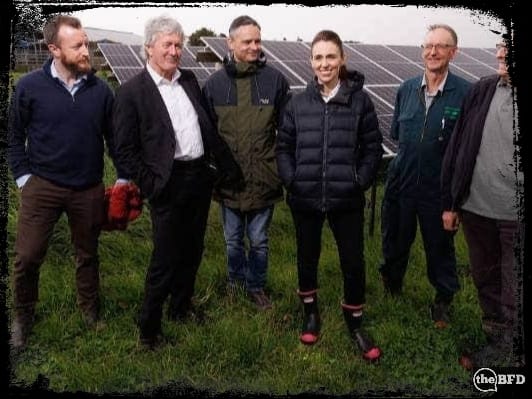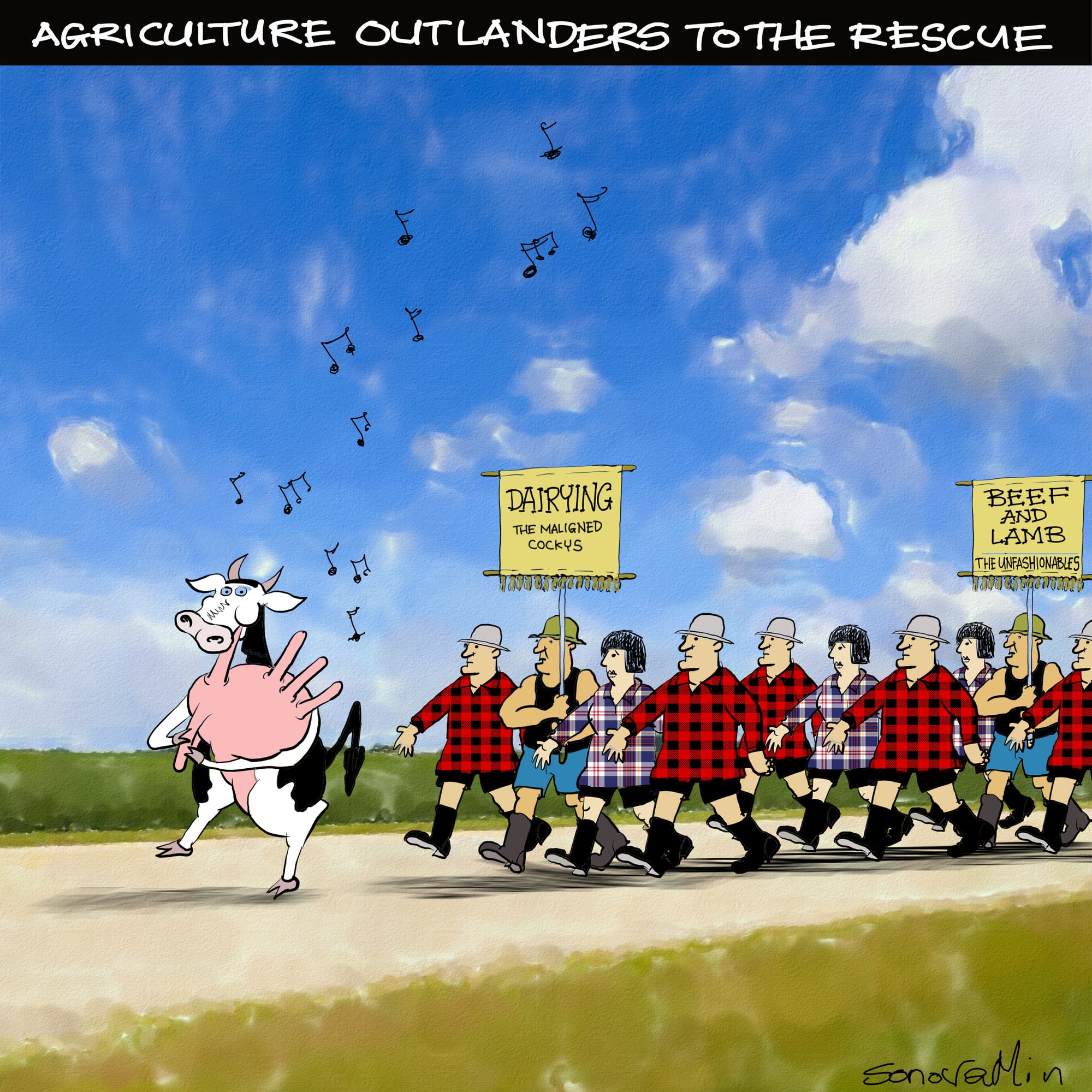Table of Contents
The farming consultation strategy document, He waka eke noa, announced by Jacinda Ardern in yet another dress-up photo-op, this time with puffer jacket and red bands at a podium of hay bales, will see the destruction of the farming industry as we know it.

Farming is our largest overseas export earner; one that the Labour party has consistently set out to discredit and disenfranchise. The systematic undermining and vilification of the industry will have come to a point of no return with this new policy strategy, should this Labour Government be re-elected and this madness implemented.
Farmers are the backbone of New Zealand and deserve our thanks and respect.

And why destroy the industry? Just so this Government can virtue signal to the rest of the world, where the most significant polluters cannot believe their luck as they watch us destroy our economy and way of life and take up the opportunities we so wilfully renounce.
The Government takes the moral high ground, destroys highly efficient food production practices, bankrupts farmers, and then postures on the world stage. We can instead plant pine trees on developed, arable land. On the bright side, apparently, pine needle tea is good for scurvy, and pine needle syrup is helpful for cocktails and coughs. Does pine needle shortbread appeal? Or Nordic Pine Bark Cookies? The latter two require butter, so they may not be possible, given butter may be rationed if available.

What about the Paris Agreement?
“In December 2015, 196 governments reached an agreement in Paris to jointly address the threat of climate change. Although the Paris agreement does not explicitly outline the role of agriculture in reducing global emissions, it does present opportunities for both mitigation and adaptation, and its preamble makes clear that the global community must address climate change’s effects on agriculture to build resilience and enhance food security globally.”
Agriculture and the Paris Agreement – Center for American Progress
How can we build resilience, enhance food security, and decrease hunger if we decrease food production and availability?
Chris Luxon continues to agree with the Government that we need to cut farm-based emissions; something that in itself is a questionable and suspiciously politically correct statement, but he did react forcefully against the announcement in general.
“National Party leader Christopher Luxon says Tuesday’s emissions announcement is a disgrace to New Zealand farmers who he says are already the most carbon efficient in the world.”
“The Government’s consultation document on the proposal said total revenue from the agricultural sector could be “significantly affected” by the plan – with sheep and beef net revenue potentially dropping 24 percent.”
“This is utterly unacceptable, what was announced yesterday,” Luxon said of the proposal.
“What it’s saying is one-fifth of our sheep and beef farmers will be gone by 2030 [and] a 5 percent reduction in our dairy farmers in that period of time,” he told AM on Wednesday.”
“It’s a sector that employs 350,000 people across the country, feeds 40 million people across the world and generates a huge amount of our export earnings.”
“We understand we have to price agricultural emissions and we ultimately have to reduce our emissions [but] you can’t support it in this form,” Luxon said of the Government’s proposal.”
(Note: Do we really understand we have to price agricultural emissions? Another cop-out by this flip-flop man.)
He said National would support an “industry-led solution” to reducing carbon emissions.
Luxon said the Government had made “its own” additions to the Emissions Reduction Plan released in May, which he described as “unpalatable”.
O’Connor said New Zealand would continue producing high-value, high-quality products that produced a lower carbon footprint, under the Government’s proposal.
“That’s the space that we have to be – as a nation of food producers,” he told AM.
Kiwis and Kiwi farmers are some of the most adaptable, innovative people in the world – particularly when it comes to food production.
On Tuesday, Federated Farmers said the Government’s plan would “rip the guts out of small-town New Zealand”.
See the full report at Emissions announcement a disgrace to New Zealand farmers, National leader Christopher Luxon says | Newshub
They “rip the guts” out so that countries with appalling farming practices can take up the slack and sell their product to the markets that we no longer can because they have put our farmers out of business.
Frank Mitloehner, professor of animal science and air quality extension specialist at the University of California, Davis, delivered the fall 2021 Heuermann Lecture on Oct. 25. He discussed beef’s path to sustainability.
Mitloehner argued the environmental impact of livestock production has been overstated. “For example, livestock emissions account for just 4% of greenhouse gasses, while fossil fuels contribute up to 80%”, he said.
“It’s still important for the livestock industry to reduce greenhouse gas emissions”, Mitloehner said, but his research, which is gaining acceptance among climate and environmental experts, shows that livestock production is not the environmental culprit it has been made out to be.
In California, for example, dairy farmers have begun storing animal waste in covered lagoons rather than open ones. The covered lagoons keep methane out of the air and trap the gas so it can be converted into renewable fuel, Mitloehner said. Since 2015, when California began providing dairy farmers with financial incentives to adopt covered lagoons and other methane-reducing practices, California has reduced its methane emissions by about 25%.
“I believe there is way more of an opportunity than a challenge”, he said.
In February 2022, The World Bank stated:
The livestock sector is a pillar of the global food system and a contributor to poverty reduction, food security and agricultural development. According to the FAO, livestock contributes 40% of the global value of agricultural output and supports the livelihoods and food and nutrition security of almost 1.3 billion people. At the same time, there is wide scope to improve livestock sector practices so that they are more sustainable, more equitable, and pose less risk to animal and human health.
Currently, the livestock sector emits an estimated 7.1 GT of CO2-equivalent per year, representing 14.5% of human-induced greenhouse gas (GHG) emissions. Increasing the efficiency of livestock supply chains is key to limiting the growth of GHG emissions in the future.
Moving Towards Sustainability: The Livestock Sector and the World Bank
Increasing the efficiency of livestock supply chains is key to limiting GHG emissions in the future is increasing the efficiency of livestock supply chains – not destroying an industry.
And just when you think this can’t get any worse, it does.
“Maori sheep and beef farmers may get taxpayer assistance to counteract emissions tax disadvantage.”
https://www.newstalkzb.co.nz/on-air/heather-du-plessis-allan-drive/audio/barry-soper-political-editor-on-maori-sheep-and-beef-farmers-getting-taxpayer-assistance-to-counteract-emissions-tax-disadvantage/
And what does the name of this farming emission strategy mean? He waka eke noa.
A canoe which we are all in with no exception. We are all in this together. An example of when this can be used perhaps when a group of you are going to the movies but one of them doesn’t have any money so wouldn’t be able to go along. You can say he waka eke noa, meaning you will pay as you are all in one group and it would not be the same if they were to miss out.
www.maori.cl/Proverbs.htm
You will pay.
You can bet the farm on that.









